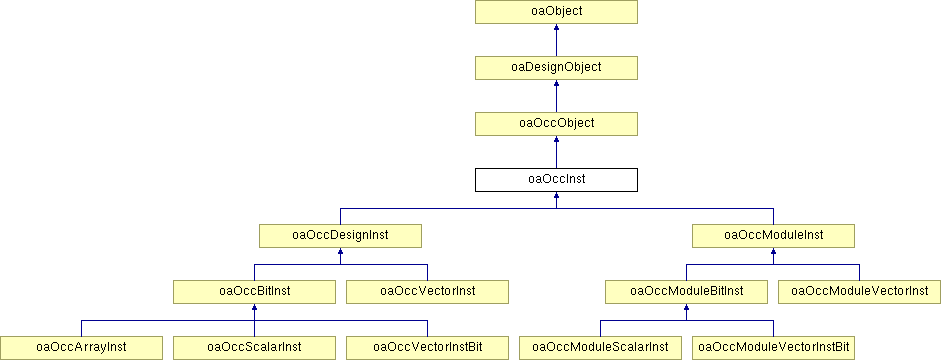 |
 |
 |
||||||
Inheritance diagram for oaOccInst:

 |
 |
Public Methods | |
| oaOccurrence * | getMasterOccurrence (oaBoolean expand=true) const |
| void | getName (oaSimpleName &name) const |
| void | getName (const oaNameSpace &ns, oaString &name) const |
| void | getPathName (oaSimpleName &pathName) const |
| void | getPathName (const oaNameSpace &ns, oaString &pathName) const |
| oaInst * | getInst () const |
| oaModInst * | getModInst () const |
| oaUInt4 | getNumBits () const |
| oaBoolean | isBound () const |
| oaBoolean | isImplicit () const |
| oaBoolean | isOccDesignInst () const |
| oaBoolean | isOccModuleInst () const |
| oaBoolean | usesTermPositions () const |
| oaCollection< oaOccInstTerm, oaOccInst > | getInstTerms (oaUInt4 filterFlags=oacInstTermIterNotImplicit) const |
| oaCollection< oaOccAssignment, oaOccInst > | getAssignments () const |
Static Public Methods | |
| oaOccInst * | find (const oaOccurrence *occurrence, const oaSimpleName &name) |
Public Types | |
| enum | { dtIndex = oacInstDataType } |
An oaOccInst may correspond to an oaModInst, an oaInst, or both:
An oaOccInst will always have an oaOccurrence that is its parent.
An oaOccInst will always have an oaOccurrence that is its master except at the frontier which is the bottom level of the occurrence hierarchy.
All occurrence instances have names. These names are non-hierarchical names that are scoped relative to the parent occurrence. For an occInst that is an occurrence of an oaModInst its name is the name of the oaModInst. For an occurrence of an oaInst that doesn't have an oaModInst (a physical-only instance) its name is the name of that oaInst.
OccInsts always have an InstHeader which is one of oaOccInstHeader or oaOccModuleInstHeader. This header contains the attributes that are common for all of the occInsts with the same master within the same parent occurrence.
The oaOccInst class can be observed by deriving from oaObserver<oaOccInst>.
|
||||||||||||
|
This function searches the specified occurrence looking for an instance with the specified name. If name is hierarchical, this function will descend into lower levels of occurrence hierarchy, expanding the hierarchy and binding the master designs as needed. The instance is returned if found, otherwise NULL is returned.
|
|
|
This function returns a collection of occurrence assignments associated with this instance. |
|
|
This function returns the corresponding instance in the block domain. NULL will be returned if the master design for this instance does not have a top block.
Reimplemented in oaOccArrayInst, oaOccScalarInst, oaOccVectorInst, and oaOccVectorInstBit. |
|
|
This function returns a collection of occurrence instTerms associated with this instance.
|
|
|
This function attempts to return the master associated with this instance. If expand is true and the instance cannot be bound, NULL is returned. An exception will be thrown if the instance is a vectorInst or an implicit vectorInstBit, as there is no occurrence hierarchy beneath those types of instances. An application will generally make a pass over the occurrence hierarchy calling getMasterOccurrence with expand set to true to expand the hierarchy to the desired depth. Later traversals will set expand to false so the traversal does not cause additional expansion. See oaOccTraverser for a utility class that can simplify walking the occurrence hierarchy
|
|
|
This function returns the corresponding instance in the module domain. NULL will be returned if this instance is an occurrence of a physical-only instance.
Reimplemented in oaOccModuleInst, oaOccModuleScalarInst, oaOccModuleVectorInst, oaOccModuleVectorInstBit, oaOccScalarInst, oaOccVectorInst, and oaOccVectorInstBit. |
|
||||||||||||
|
This function fills out name with the name of this instance. The name is mapped according to the specified nameSpace.
|
|
|
This function fills out name with the name of this instance.
|
|
|
This function returns the number of bits of this instance. This function always returns '1' for scalar and array instances. The function can return '1' or more for vector instances. |
|
||||||||||||
|
This function returns the full path name of this instance in the specified nameSpace in the specified pathName string. The pathName is relative to the top occurrence in the occurrence hierarchy containing this instance.
|
|
|
This function fills out pathName with the full path name of this instance, relative to the top occurrence in the occurrence hierarchy containing this instance.
|
|
|
This function returns a boolean value that indicates if this instance is currently bound to its master. An instance is bound to its master if some traversal is made from the instance to the master or an object in the master. If the instance is bound, then its master is in memory and the linkage from the instance to the master is established.
|
|
|
This function returns a boolean value that indicates if this instance is implicit, having been automatically created as a result of the creation of a vectorInst. |
|
|
This function determines if this object is an instance of one of the classes derived from the oaOccDesignInst class. The function returns a boolean value of true if the oaOccInst is an oaOccDesignInst. |
|
|
This function determines if this object is an instance of one of the classes derived from the oaOccModuleInst class. The function returns a boolean value of true if the oaOccInst is an oaOccModuleInst. |
|
|
This function returns a boolean indicating how connections to this instance have been made. If the instTerms associated with this instance connect to terminal positions, this function returns 'true'. Otherwise, this function returns 'false'. Note that if the collection of instTerms for this instance is empty, this function will also return 'false'. |
|
|
|

Copyright © 2002 - 2010 Cadence Design Systems, Inc.
All Rights Reserved.